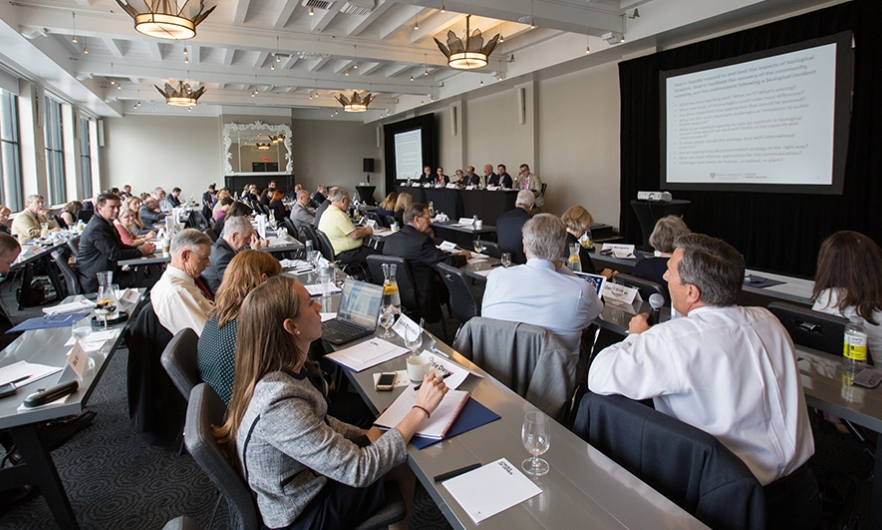Biosecurity stakeholders offer recommendations for National Biodefense Strategy
Center News

July 12, 2017 – More than 50 public and private sector biosecurity stakeholders gathered at a meeting convened by the Johns Hopkins Center for Health Security on June 22 in Washington, DC, to engage in a discussion about US biodefense capabilities and offer recommendations for the forthcoming National Biodefense Strategy and Implementation Plan.
When it is delivered to Congress this fall, the strategy and implementation plan will review, assess, and identify opportunities to strengthen biodefense policies, practices, programs, and initiatives across the federal government.
“A strategic approach to biodefense is vitally important for our country’s security, now and into the future,” said Tom Inglesby, MD, director of the Center. “We commend our US government colleagues for considering highly relevant stakeholder input that could be integral to the successful development of this national strategy.”
Inglesby moderated the meeting with Anita Cicero, JD, the Center’s deputy director.
During the day’s extensive discussions, leading experts and practitioners from government, industry, and academia shared their thoughts on the US biological threat landscape; existing programs, policies, and mechanisms for mitigating the broad spectrum of naturally occurring, accidental, and deliberate biological threats facing the nation; unmet challenges in global, national, and subnational emergency preparedness and response efforts; and priorities for strengthening the United States’ national biodefense enterprise. Their contributions will help to inform the Departments of Defense, Health and Human Services, Homeland Security, and Agriculture—tasked with developing the strategy and implementation plan—as well as other federal agencies and officials responsible for biosecurity.
The group’s key recommendations were:
- Improve biosurveillance capabilities and laboratory networks
- Perform risk assessments and characterize threats
- Strengthen emergency response capabilities, including decontamination efforts
- Build global capacities for bio-threat preparedness and response
- Prioritize prevention efforts
- Organize the US government for biodefense
- Leverage private sector capabilities to counter biological threats
- Catalyze innovation in medical countermeasures research, development, trials, and delivery
- Strengthen healthcare system response and workforce
A summary report with more details on each of these key recommendations is available here.
The meeting was supported by funding from the Open Philanthropy Project, which awarded the Center a $16 million grant earlier this year to support the Center’s work on strengthening health security and public health preparedness and on preventing and preparing for the most serious global biological risks.
About the Johns Hopkins Center for Health Security:
The Johns Hopkins Center for Health Security works to protect people from epidemics and disasters and build resilient communities through innovative scholarship, engagement, and research that strengthens the organizations, systems, policies, and programs essential to preventing and responding to public health crises. The Center is part of the Johns Hopkins Bloomberg School of Public Health and is located in Baltimore, Md.
